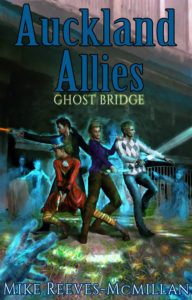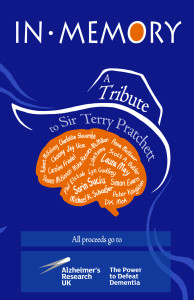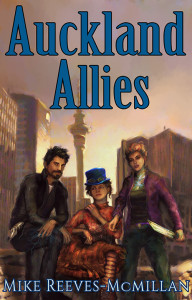I thought you might enjoy the latest chapter from the nonfiction book I’m working on, Writing Short: The Craft and Commerce of Short Story Writing. It’s one of those ones that turns up at four in the morning and takes over your brain. I blame the Writing Excuses podcast I listened to yesterday.
You’ll often hear the expression “raising the stakes” in relation to storytelling. It’s a term that can be easily misunderstood, as I was reminded by listening to an excellent podcast on stakes by the Writing Excuses team (season 11, episode 24).
Stakes are the motivations that prevent a character from just giving up and walking away in the face of opposition, danger, difficulty or challenge. That means that the most powerful stakes are personal. There’s a reason for the cliché “this time it’s personal” in movie sequel taglines.
“Raising the stakes,” then, isn’t just about “before, the city was under threat, now it’s the whole country! Next, the world!” Obviously, in the abstract, a threat to the whole country is more important than a threat to a single city. But we’re not in the abstract. We’re telling stories, which means we’re looking at issues through the eyes of characters—people—and people respond to what is important to them.
A tragedy touches us much more if we know someone involved. A personal example: a few years ago, in the city where I live, some engineers and tradespeople were inspecting a new water pipeline. Somehow, gas had leaked into the pipeline, and it exploded and killed one person, severely injured a second, and injured several others (one employee and some contractors).
As it happened, I was working for the city water authority at the time, training people on the new computer system they were putting in. I heard about the tragedy, and wondered if it had impacted anyone I knew.
And then the media published the name of the woman who was killed, and I realised that it was someone who had been in my classroom two days before, who I’d spoken with and helped. The man who was badly injured (losing several limbs) had been in the same classroom. And I’d also trained the other employee who was injured.
That made the tragedy much more tragic to me. I know that in an ideal world, whether someone has a face and a name that you know, whether you’ve met them and spoken to them, whether you know their story, shouldn’t affect how much you care about their fate; but the reality is that it does.
Knowing this can easily lead you down a bad path with your writing, as well as a good one.
If you know that stakes are personal, that motivations with a lot of emotion attached to them are ones that will drive characters powerfully through great trials and also engage the audience, the temptation is to use cheap, thoughtless tragedy to make your story more powerful—just as fast-food companies use salt, sugar and fat to make their food more attractive to consumers without spending much money.
A classic example of this is the trope of the Woman in a Refrigerator.

The trope gets its name from an incident in a Green Lantern comic, in which Green Lantern (Kyle Rayner) finds that an assassin has broken into his apartment while he’s out, killed his girlfriend, and stuffed her into the refrigerator for him to find. The thing that is wrong with the trope is that it is treating a character, and specifically a female character, solely as a source of emotion and motivation for another, more “important” character—not as a person with significance for their own sake, with their own story and character arc. The same thing can be done with male characters, of course, but because women are more often denied their own stories anyway, using a woman in this way is particularly pernicious.
It’s also setting up for the “man alone” trope. This is where the damaged loner goes out on the road seeking vengeance/peace/redemption/escape from his past, and all of that hovers in the background as he encounters various adventures, both driving his wandering from setting to setting and also making sure he never develops ties or settles down anywhere. If he does start to develop ties, either they will be tragically and brutally taken away from him, or he will leave rather than risk that happening. The problem with this trope is that it feeds the fantasies of actual damaged loners, discourages them from seeking help or support, and can help place them in a position where they end up creating real tragedies for other people.
I should clarify, at this point, that I’m not advocating any form of censorship, or saying that these stories should be forbidden and never told at all. What I’m advocating is that you, my reader, who wants to learn to write good stories, think about the stories that you are going to write, and whether they play into unhealthy societal patterns and reinforce them.
Along with the “man alone” is the “one woman” trope, where there is only one female character of any significance in the story, and so she never talks to another woman or forms one of those strong female friendships that are such a source of power for real women. Remember, stakes are personal, which means that having more, and more significant, relationships increases the scope and possibilities of your story. And loss is not the only motivator, as the last chapter, I hope, abundantly demonstrates. [Note: this is part of a book, as I mentioned, and the previous chapter sets out various kinds of motivation.]
While I’m talking about overused and toxic tropes: it’s true (unfortunately) that many women have experienced sexual assault. It’s also true that this is an experience that often impacts them for many years, even for the rest of their lives. But it’s not the only experience that can motivate a female character, and it shouldn’t be tossed casually into a female character’s backstory as a shortcut that doesn’t require much thought or follow-up.
I’ve said above that loss is not the only motivator. One reason, I think, that it’s overused as a motivator is that in epic stories, often we begin with the potential hero growing up in a remote, rural setting, in a life that they must be motivated to leave in order for the adventure to kick off. This is the cliché beginning for an epic fantasy: the Chosen One, a humble farm boy, survives the destruction of his whole village and the death of his parents or parental figures, which launches him on the adventure that he previously refused to embark on. Now, to the credit of the cliché epic fantasy, he will usually start gathering companions immediately, rather than being the “man alone,” but when you’re writing a short story instead of an epic, that’s tricky to pull off. Perhaps don’t start by motivating your protagonist with loss, and see if that leads to a better story?
Let’s think about Star Wars (the original trilogy) for a bit to see how this works. We open with the rebel ship boarded, the planet Alderaan destroyed; this is what movie makers, in particular, sometimes think of as “high stakes”. The fate of the galaxy! Destruction of planets! The problem is, at this point we really don’t care much, because it isn’t particularly personal. It’s gone too big too quickly. But it’s effectively a prologue anyway, letting us know that there will be Big Space Stuff coming up; we need to know that, because the next thing we see is a gawky kid called Luke growing up on a farm. He talks about getting involved in the war, like his friends, but he’s not really going to do it; he’s tied down by his family (his uncle and aunt) and small, local obligations.
When he sees the message from the attractive space princess, though, which conveniently falls into his hands, he’s motivated enough to go looking for the old hermit to find out more about her. The old hermit wants him to get involved, but he’s not that keen.
Until! They go back to his home, and it’s destroyed, his uncle and aunt (foster parents) dead, and it’s the fault of the Empire. Now it’s personal! Not only does he have nothing to keep him at home anymore, but he has a motivation to go out and get involved in the Big Space Stuff that has taken away his comfortable provincial life. Out there, he’ll meet companions, and come to have more and more reasons to fight and persevere.
As will his companions, though. Think about Han Solo for a minute. We meet him as almost a “man alone,” although he does have a sidekick. He’s out for himself, very much for hire, worried about his debt, skeptical about the old hermit’s mysticism, contemptuous of this kid with dust behind his ears. But as his ties to the others grow, as they risk their lives to rescue him, his stake in the conflict increases, and he becomes heroic, rather than self-absorbed and uncaring. He becomes the guy who turns up with a rescue when things seem hopeless.
He becomes, in fact, more admirable. Remember I talked about the admirable character, who is willing to bear personal cost for the sake of others? [Note: in another earlier chapter.] There’s an interesting sidelight here on the question of stakes, and it comes to me via Terry Pratchett. His characters Granny Weatherwax and Carrot Ironfoundersson, in Lords and Ladies and Men at Arms respectively, both say, at key moments: “Personal isn’t the same as important.”
In the Writing Excuses podcast episode I referenced at the start of this chapter, several of the podcasters discuss how villains often act out of motivations that are to do with preserving order or doing “good” for the community as a whole, while heroes will be driven by stakes that are more personal. I suspect that part of the reason for this is that the great villains of the 20th century—to those in English-speaking countries, at least—were fascists and communists, who placed the state above the individual and committed atrocities in service of that philosophy. (Nor were they the first or the last to put abstract principles before humanity, with tragic consequences.) It’s also because someone who is personally motivated is easier to empathise with, and so less likely to be regarded as a villain. But there is also the admirable character to consider, the one who will, when the chips are down, set aside what’s best for them personally and do something for the good of others, or their people, or their community, or their nation. We naturally value and praise this quality as a society, since we like to have people around who will help us, even at cost to themselves.
So what’s going on when someone values the concerns of others, and the big picture, above their personal stakes in the situation? I’d suggest that they’re transcending that instinct we all have to focus in on our immediate, short-term, personal benefit, to see those who are close to us as more important than those who are distant from us; who can, metaphorically speaking, look at a row of power poles that look smaller the further away they are, and not just know, but believe and act as if, each of them is actually the same height.
This is a higher order of thinking than the instincts of fear and anger that protect our own interests at any cost, and it’s the kind of thinking that produces great and wonderful results in our society. Whether it’s Harriet Tubman returning again and again to rescue others from slavery, or Malala Yousafzai speaking out for the education of women after being shot for going to school, or a soldier carrying a wounded comrade to safety under fire, we recognise the courage and selflessness of these people as an admirable kind of humanity. And we take inspiration from their stories exactly because they put their lives at stake because something else, someone else, matters more to them. Villains, in contrast, are those who will often claim to be acting for some kind of greater good, but who prefer to see other people pay the cost.
Stakes are personal. They will drive and draw your characters through great opposition and inspire them to magnificent deeds. But they don’t have to be selfish, and, in fact, we respond even better when they’re not.







